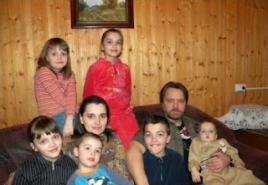Essay my fears at school. Essay - what is fear
Foreword:
The essay was written on September 3, 2014, much earlier than most of my poems. In those days, esotericism was still part of my hobbies, which was reflected in the content of the work. Now I present it to your attention, maybe it will seem to someone interesting elements my long-term outlook. First of all, to myself.
Everyone knows the unpleasant feeling of fear. Why unpleasant - yes, because it simply cannot be otherwise, because at this moment panic seizes the mind, as a result of which attention and concentration are significantly reduced, the mind becomes uncontrollable, goosebumps run through the body, control over emotions is lost and some stiffness in movements is felt. Agree, such a situation is far from beneficial, especially if an outbreak of fear occurs at the time of study or work. Yes, and during leisure time, it is able to instantly dispel all pleasure and cast reality into the background. The reason for all this is the application of intellectual efforts by man in order to find the source of fear. Only now the mind, feeling the suffocating grip of this terrible feeling, refuses to work, and the person tries harder and harder to gain access to saving brain resources. The result is the emergence of a desire to cry, scream, quit the job, even if it is practically brought to the end.
People call this man a coward, throw offensive ridicule at him, thoughtlessly utter insults; intentionally humiliated if they see or know that he is afraid of something. However, here is a fact that should be paid attention to: FEARS HAVE ABSOLUTELY EVERYONE. This is an axiom. The fact is that individuals have their own varieties and reasons for this feeling. Someone quite calmly endures the dark time of the day or approaches wild animals, but is afraid of losing a loved one. Someone is afraid of heights, someone is unusually afraid to enter the water. Different people have different fears.
At this point, it would be very logical to object: "What are you telling us here about the fear of the dark and the fear for the well-being of relatives and friends, because the degree of fear in this case is completely different! To be afraid of water? Yes, this is real stupidity!" I agree, the comparison is unacceptable. Unacceptable for the author of the objection and exclusively for him, unless someone else supports his views. I would only like to bring to the mind of readers that if everyone is capable of being afraid, then it is absolutely pointless and stupid to provoke anyone and laugh at those who are suddenly seized by a feeling of fear. It doesn't matter who is afraid of what. Such a person needs to be helped, treating him with due attention, patience and kindness. Of course, there are also cases when it is not forbidden to make a moral or even use force, so long as this does not humiliate the dignity of the frightened. To do this, you need to be a kind of psychologist who can pick up a unique key for each soul. This is extremely difficult. It is much easier to destroy, to expose a person to the general ridicule. Basically, this is what most people do.
I think everyone who reads this essay would like to get rid of the nasty feeling of fear. To help yourself, first you need to understand: FROM FEAR IT IS IMPOSSIBLE TO GET RID OF. It is also impossible to exclude love from life or give up natural needs for food, sleep, rest, work, sexual satisfaction. Well, it's impossible. Not at all.
Now let's try to answer the question: why, in our own words, get rid of fears? Yes, they prevent us from enjoying life. But they interfere only because we overreact to them. You see, fear does not prophesy or promise anything. He simply cannot do this, since all fears, together with emotions, live in the mental world with their own laws and orders. This world is separated from ours, the physical one, by a barrier that can break through with a powerful emotional outburst and let mental demons in to us. These creatures will gradually gain strength, intervene in all processes, and a person will be trapped, start to panic, instead of sitting down and just calm down. And this is at best. Indeed, many of the most difficult crimes from a moral point of view are based on fears. Desertion, looting, cannibalism, murder, various perversions (necrophilia, bestiality) ... I think it is clear what kind of fear causes each of these acts.
The main thing to remember is: FEAR JUST WARNING. And that's all. It shows only an event that is possible with some degree of probability, which will happen if, for example, something is not done at a certain time, or vice versa, and does not decide to act. A good analogy is road signs. After all, "Dangerous Turn" does not promise that you are guaranteed to die, but recommends slowing down and keeping to the right edge of the road to avoid an accident. It's the same with fears. When you rise to a height, fear does not prophesy death from a fall, but hints at the need to be more careful, to look for reliable support. He speaks to us in the language of emotions, which, unfortunately, we often misunderstand and, neglecting a good adviser, ultimately harm ourselves.
Do not reproach yourself for being weak if you are afraid. And that's why. Road signs are placed where cars drive. In the remote taiga, where not only the car - the beast will not make its way, you will not find them. In the same way, fate helps us to overcome the long, dangerous, but extremely interesting and mysterious Road of Life. And fears, anxieties, experiences serve as something like pointers. Each person follows his own path, therefore, he will have his own, special signs, that is, special fears. Rejoice: if you are afraid of something - fate listens to you, helps, this proves that YOU LIVE, AND NOT JUST EXIST. Why and what to be afraid of, for example, a dead man?
Fear will always be, only its causes change. Once again, fear is not to be feared. Think, analyze, act. And fear will grow from a controller and a manipulator into a servant or even a friend.
What if you're not afraid of something? Does that mean you died? In no case. You have become stronger and more experienced and now do not need advice to make the right decision.
Did someone offend you, catching you in a panic situation? Do not worry. The abuser hides his fears by turning his attention to you. If he hides, then he does not understand the language of emotions, and for him fear will be the master and ruler. Of course, until this person works on himself.
On a global level, the formation and development of a personality can be viewed as the assimilation by a personality of the social programs that have developed in a given society at a given point in time, where each generation of people finds society at a certain stage of its development and is included in the system of social relations that has already taken shape at this stage. At the same time, the first and obvious fact from which a person's life begins is that he is born as a biological being. His body is a human body and his brain is a human brain. At the same time, the individual is born biologically, and even more so socially immature; the maturation and development of his organism from the very beginning takes place in social conditions, inevitably leaving a strong imprint on these processes. The biological development of the individual is the initial prerequisite for his mental development. But these premises are realized in the social actions of the individual. The whole genetically fixed system of properties and mechanisms is a common initial prerequisite for the further development of the individual, ensures his universal readiness for development, including mental development. mental activity of a person, determined by his social relations, helps to achieve huge "degrees of freedom" in choosing actions and to respond properly to what is happening around. But this “freedom of action” will always be limited by the fact that “significant others”, namely parents, impose on the child. And these restrictions will eventually emerge as the strongest fear.
From the point of view of cybernetics, any system is stable only without a rigid framework constraining it. Known fluctuations of certain "sections" provide it, within certain limits, with the necessary "manoeuvring" and adaptability to changing conditions. But in relation to a person, these restraining frames still exist, because. from birth to the end of life, a person is subject to social influence. . A child is born with a certain predisposition to respond to external influences, i.e. type of higher nervous activity. He is dependent on his parents, who are authoritative people for him in this unfamiliar world. The child completely trusts them, which often leads to the displacement of their own ways of reacting to the environment. If a person develops a certain stereotype of behavior, he can intentionally avoid a new experience, as if "closing his eyes" to himself and the circumstances. A situation arises when you have to deny some newly discovered sides of yourself in order to preserve the familiar image of your own "I". Such a conflict between own desires and aspirations and the old way of their implementation must be resolved, because otherwise there is an awareness of the discrepancy between one's behavior and one's ideas. A person finds himself in a state where he is not able to go beyond the limits narrowed by himself. What is the root cause of the formation of such a framework that subsequently prevents a person from developing normally and forcing him to act according to the same scenario? And as this determinant is the orientation of the personality, which, in our opinion, depends on avoiding the diffuse fear of a person, which is formed in childhood. The orientation of the personality, its attitudes, over and over again generating certain actions in homogeneous situations, then pass into character and are fixed in it in the form of personality traits. But the character determines the reactive, and not the initiative, primary behavior of the individual, in contrast to the orientation, which acts as a system-forming property of the individual that determines it. psychological warehouse. Personality - as a socio-psychological essence of a person, is formed as a result of the assimilation by a person of social forms of consciousness and behavior, the socio-historical experience of mankind. At the same time, it must be taken into account here that a person is not only an object of social relations, not only experiences social influences, but also refracts and transforms them, since gradually a person begins to act as a set of internal conditions through which external influences are refracted. These internal conditions are an alloy of hereditary biological properties and socially determined qualities. The influence of the family environment also significantly affects the development of the individual. Of particular importance here is the form of parental behavior, beliefs and values. Parents serve as role models and, through their own actions, have an impact on children that lasts throughout their later life. As personality develops, internal conditions become deeper, as a result, people act not in accordance with actual facts, but in accordance with their ideas about these facts. And here there is a conflict between the personality and the beliefs that "significant others" impose. These beliefs, imposed from outside and conflicting with the true desires of the individual, each person interprets in his own way and can express it in the future as the strongest fear or diffuse fear. In our study, fear acts as a basic emotion that sets the direction of the main, individual human behavior. After all, all the needs of a biological organism come down to satisfying the basic vital needs. No matter how much we argue about the highest development of a person, about his self-actualization, human significance, but if oxygen suddenly disappears in the audience, then everything will become insignificant except for only one need - the need to survive and the fear of death. And if we turn to one of the theories of the origin of human culture, we will see that after the violation of the etiological balance (the power of instinctive inhibition of intraspecific aggression is commensurate with the physical ability of the animal to inflict a mortal wound on its relative), a “herd of madmen” survived, in which psychasthenics with a violation of genetically fixed forms of behavior and extraordinary plasticity of the brain. In such individuals, the beginnings of animistic thinking were formed - an unnaturally developed imagination turned into a tendency to attribute the properties of a living body to a dead body. The object of the most intense fantasies was the deceased relative, from whom malevolent and unpredictable actions were expected. The neurotic fear of the vengeful dead served as the first artificial limit to intra-group killings. This was expressed by ritual actions in relation to the dead, as well as biologically inappropriate care for sick and wounded relatives, aimed at preventing them from becoming dangerous dead. It was this fear of a dead relative that gave birth to human culture.
According to K. Horney's theory, two needs are characteristic of childhood: the need for satisfaction and the need for security. Satisfaction covers all basic biological needs: food, sleep, and so on. Although Horney attached importance to the satisfaction of physical survival needs, she did not believe that they play a major role in the formation of personality. .
A child is born with a certain predisposition to respond to external influences, i.e. type of higher nervous activity. But the decisive factor in the development of personality are social relations between child and parent. The bodily evaluation process is a control system that promotes the proper satisfaction of the infant's needs. The infant evaluates his experiences according to whether he likes or dislikes them, whether they please him or not. This evaluation stems from his spontaneous response to immediate experiences, whether they be sensory, visceral, or emotional stimuli. The personality structure is subsequently formed through interaction with the environment, in particular with significant others (for example, parents, brothers and sisters). In other words, as the child becomes receptive and his cognitive and perceptual abilities develop, his self-concept becomes more differentiated and more complex. Therefore, to a large extent, the content of the I-concept is a product of the socialization process .. And here we can say that the main task in the development of the child is the need for security accompanied by the emotion of fear, because without emotion a need cannot form, and the child depends on satisfying this need completely from his parents, who are authoritative people for him in this unfamiliar world. The child completely trusts them, which leads to the repression of their ways of reacting to the environment, respectively, we can say here that the repression is accompanied by an emotion of fear, or, as Karen Horney believed, the child is trying to win parental love in order to satisfy the main need for security .. And as we know , a person acts for the realization of a motive, which is based on emotions. Emotions lay down values, and values form a motive. But the emotional relationship gives us only a primary indication of the meaning, but does not reveal it, because it does not allow us to correlate the relationship to the object with the life relationships of the subject. The value orientations of a person are always endowed with his individual personal meaning. Speaking about the meaning of something, one should not lose sight of the process itself or the mechanism of meaning formation. Three main factors are involved in the formation of meaning - the subject, the meaning-maker (source) and the sense-acquirer. The concept of the subject answers the question “for whom is meaning?” Of course, meaning exists for a person, this particular person. Meaning-maker is the value - the source of meanings for the subject. The role of the sense-bearer is played by the acts of the subject's life activity - his actions, his efforts, various manifestations of his activity and life in general, expected and lived. In our case, diffuse fear lays down the basic value of the individual, endowed with individual personal meaning, which forms the basis of the individual's behavior.
Each person interprets reality in accordance with his subjective perception, and his inner world fully accessible only to himself. Diversity individual submissions about objective reality and the subjective attitude towards it can be explained by differences in past experience. After all, personality, according to behaviorism, is an accumulated set of studied behavior patterns. Through learning, we gain knowledge, acquire language, form attitudes, values, fears, personality traits, and self-esteem. But the first models of behavior are laid by the parents, which gives the basis for behavior in later life. Also, behavior is significantly influenced by how people predict their future. In our case, a person always turns to future events and tries to build his behavior in such a way as to minimize the events associated with the strongest fear, or, as we called it, diffuse fear. Speaking of predicting behavior, a person will act in accordance with his perception of events occurring at the moment. Our present interpretation of past experiences, not their actual circumstances, influences our present behavior. And here we see that the diffuse fear of the individual is the sum of the unique innate abilities and characteristics of the person's past experience. From this we can conclude that individual differences between people should be understood in terms of behavior-environment interactions over time. Avoiding the strongest fear, a person is affected by stimulus events that will come after him, namely, his consequences.
American psychologist Carl Rogers believed that there is a fundamental aspect human nature, which encourages a person to move towards expanding their own experience and more realistic functioning. He emphasized that this desire to expand, spread, become autonomous, develop is visible in every human life. For a person, the development of his personality is determined by assimilation, assimilation of experience and what he teaches, modification about himself and natural movement from a problem, a conflict to its real practical solution.
Abraham Maslow emphasized that the desire for self-actualization and higher goals in itself indicates psychological health. He considered the formation of personality as a work of self-actualization, as a long-term constant involvement of a person in the development of one's own capabilities to the maximum possible, and not satisfaction with less out of laziness or lack of self-confidence. But the question is what stands in the way of self-actualization of the personality, what prevents it from fully revealing itself? In our case, a person always refers to future events and builds his behavior in such a way as to minimize the events associated with the strongest fear. The development of the emotion of fear in the early childhood is associated not so much with an assessment of the danger to his life of this or that situation, but with an unexpected change in the intensity of external stimuli or with the inducing influence of stories that are unsuccessful in content, angry reproaches, thoughtless forms of punishment, etc. And already at this stage of life, the child learns to avoid negative events causing him to feel fear. A person acts on the environment in order to change events, and here, as mentioned above, simple adaptation is not effective. Personal fear carries negative consequences and a person's behavior to avoid it increases. To avoid these consequences means to behave in such a way as to prevent their occurrence. The child will do almost anything to satisfy the need for positive attention from significant others. Thus, the child's behavior is not governed by the likelihood that his experiences will retain or intensify his self-concept, but by the likelihood of receiving positive attention from significant people. Therefore, human behavior is structured in such a way as to maximize positive reinforcement and minimize punishment. In our case, the punishment is the consequences of the fear that a person regards as the most significant. K. Rogers considered this state of discrepancy between the "I" and the experienced experience the most serious obstacle in the development of psychological maturity. If there are several children in a family, individual fear is caused by the fact that a significant other (parent) acquires new experience every year, and a child is born with a certain predisposition to respond to external influences, i.e. type of higher nervous activity, the sequence of the birth of a child is also related.
An important place in the development of personality is occupied by culture - that is, the culture of the relationship of the child with significant others in his environment. Of course, this approach does not negate the importance of the biological needs of a child or an adult. But these needs are considered in the context of interpersonal relationships. Therefore, the source of fear is not limited to fears about the frustration of instinctive or libidinal needs. The normal person can bear a considerable degree of frustration of such needs (eg sexual) without anxiety. Frustration of instincts - sexuality is a convenient example here - leads to anxiety only when this frustration threatens some value or form of interpersonal relationship that, from the point of view of a person, is vital for his security. Speaking about the concepts of K. Horney, it is important to note one of them distinguishing feature: in her opinion, anxiety precedes instinctive desires, where impulses and desires do not become "drives" if they are not motivated by anxiety. Obsessions are inherent in neurotics; they are born out of feelings of loneliness, helplessness, fear or hatred and represent an attempt to live in the world around them, despite these feelings, their main goal is not the satisfaction of personal needs, but security, where security is intrusive for the reason that lies behind them anxiety.
K. Rogers considered this state of discrepancy between the "I" and the experienced experience the most serious obstacle in the development of psychological maturity. If there are several children in a family, individual fear is caused by the fact that a significant other (parent) acquires new experience every year, and a child is born with a certain predisposition to respond to external influences, i.e. type of higher nervous activity, the sequence of the birth of a child is also related.
A person cannot be understood without referring to his subjective interpretation of events. Bandura claims that the higher intellectual ability, for example, the ability to operate with symbols, give us a powerful means of influencing the environment. Through verbal and figurative representations, we produce and store experience in such a way that it serves as a guide for future behavior. Our ability to form images of desired future outcomes translates into behavioral strategies to guide us towards distant goals. Thus, we anticipate the future result and avoid mistakes. .
Thus, K. Horney wanted to emphasize the primary role of anxiety in the formation of psychological disorders. But fear must be distinguished from anxiety. Fear is a response to a specific danger, and a person can take certain actions to cope with the danger. But anxiety is characterized by a feeling of vagueness and uncertainty, as well as a sense of helplessness in the face of danger. Anxiety is a reaction to a danger that threatens the “very core or essence” of a person. This raises a question that is important for understanding the phenomenon of anxiety: what is the threat that causes anxiety aimed at? In order to better understand Horney's response to this question, we should first consider in general terms her ideas about the origin of anxiety. K. Horney considers normal anxiety, inseparable from human life with its accidents, where death is possible, the intervention of forces of nature, and so on. This anxiety she, using German, calls Urangst or Angst der Creatur. But this anxiety must be distinguished from neurotic anxiety, since Urangst not associated with the hostile attitude of nature or accidents, this form of anxiety does not give rise to internal conflicts and does not lead to the formation of neurotic defensive actions. Neurotic anxiety and helplessness are not related to a realistic view of the world, but arise from internal conflict between dependence and hostility. The source of danger is, first of all, the hostile attitude of others. Basal anxiety is the term Horney used to refer to anxiety leading to the formation of neurotic defenses. This form of anxiety, which is
manifestation of neurosis, is "basic" in two senses. First, it is the basis of neurosis. Secondly, it is "basic" because it appears at the very beginning of a person's life as a result of a violation of the relationship between the child and significant others - as a rule, parents. "A typical conflict leading to anxiety in a child is the conflict between dependence on parents (which is especially strong because the child is scared and feels alone) and hostile attitude towards them." In this conflict, the child is forced to repress the hostile attitude towards the parents, because he depends on them. The repression of these impulses deprives the child of the opportunity to recognize the real danger and fight to overcome this problem, in addition, the act of repression itself creates an internal unconscious conflict and therefore increases the child's feeling of defenselessness and helplessness. Basal anxiety is "inextricably linked to basic hatred". This is one example of how anxiety and hatred interact with each other, where one feeling reinforces the other. In other words, the relationship between anxiety and hatred can be called a "vicious circle". The feeling of helplessness is inherent in basic anxiety by its very nature. Horney is well aware that every person - including the "normal" adult - is forced to confront the influences of the surrounding culture, many of which are essentially hostile forces, but this does not cause neurotic anxiety. The difference between a neurotic and a "normal" person is explained, according to Horney, by the fact that the latter is faced with the bulk of unpleasant experiences at that period of life when he is able to integrate them, and the child, dependent on parents who are hostile to him, really helpless - and he has no other way to deal with the conflict, except for neurotic defenses. Basal anxiety is anxiety in the face of a potentially hostile world. And all the various forms of personality disorders are neurotic defenses that have been formed as a result of an attempt to cope with a hostile environment, despite the feeling of powerlessness and helplessness. Neurotic traits, according to Horney, are essentially tools of defense against basal anxiety. Now you can answer the question, what is the threat that causes anxiety directed at. Anxiety is a response to a threat human forms of behavior on which, in his opinion, his safety depends. At the time of the onset of personality disorders, an adult feels threatened by a neurotic character trait that is his only method of dealing with basal anxiety - therefore, he new force experiencing his helplessness and defenselessness. Horney believes that what is at stake is not the expression of instinctual drives, but rather those neurotic personality traits that provided security. Thus, in each person, neurotic anxiety is generated by its own specific threat; the decisive role here is played by that neurotic character trait of a person that maintains his safety. Therefore, when thinking about the problem of anxiety, we must always look for an answer to the question of what vital value is threatened; with neurotic anxiety, we are interested in that neurotic trait that relieves a person of a sense of helplessness and which is currently under threat. Thus, anything that jeopardizes a person's protective means, that is, his neurotic tendencies, can provoke anxiety. Of course, the threat does not always have the same purely external character as, for example, the threat of breaking off relations; a threat may also be an intrapsychic impulse or desire which, if expressed, jeopardizes the security of the individual. Therefore, anxiety is often generated by sexual or aggressive impulses - not because a person fears their frustration, but because the expression of these impulses endangers some forms of interpersonal relationships that, from the point of view of a person, are vital to the existence of his personality. The fact that one or both sides of the conflict can be repressed from consciousness - temporarily or permanently - only takes the same problem to a deeper level. By
In her opinion, among the intrapsychic factors provoking the emergence of anxiety, hatred is in the first place. In fact, "aggressive impulses of various kinds are the main source of neurotic anxiety." Anxiety produces hatred, and aggressive impulses, in turn, generate anxiety. It is not surprising that a person experiences a hostile attitude towards those experiences and those people who are a threat and give rise to a painful feeling of helplessness and anxiety. But since neurotic anxiety is a consequence of weakness and dependence on other, "strong" people, a hostile attitude towards these people endangers the dependence that the neurotic seeks to maintain at any cost. Similarly, the intrapsychic impulse of aggression directed at these people awakens the fear of punishment or retaliatory aggression, and therefore increases anxiety. Talking about mutual influence anxiety and hatred against each other, Horney concludes that "a particularly important cause" of anxiety is "repressed aggressive impulses."
The significance of Horney's ideas for understanding the theory of anxiety lies in the fact that she showed how conflicting tendencies of the personality become a source of neurotic anxiety, and, in addition, moved the problem of anxiety to a purely psychological context, where all social aspects of the problem are also taken into account.
And as mentioned above, the child learns to perceive this world from significant others and completely trusts them, and adults, in turn, impose on the child, without knowing it, the general scenario of life, which forms the direction of the personality and then acts as the basic value of a person who is under the influence society is transformed into a diffuse fear of the individual.
Based on the theory of K. Horney, in which the main driving force involved in the generation of neuroses is anxiety and the defenses that are built against it, we can draw a conclusion that is not limited to pathology, but also applies to the normal development of the individual:
the orientation of the personality depends on the strongest, subjective fear, or, as we called it, the diffuse fear of the personality.
It should be noted that the concept of the norm or mental health is not a static concept, but a dynamic one. The norm is characterized by a balance between reality and adaptation to it, an attitude towards self-affirmation and self-development in unity with a sense of responsibility, a sufficient potential of mental energy, with activity. The mental norm of a person includes: 1) Intelligence. Good ones mental capacity, productive thinking, the desire to find the optimal solution, relying on real facts. Knowing your strengths, the ability to achieve goals in a reasonable time. Improving skills, the presence of imagination. 2) Moral character: a sensitive person, without the callousness of "soullessness", moral stupidity. Fair, objective. Relies on own judgment. The opinion of others is not a law for him, although it is essential. Strong will, but not stubbornness, recognition of a mistake, but without self-flagellation. 3) Socially attractive adaptive behavior: contacts with people of different ages and social strata. Sense of responsibility and easy relationship with superiors, subordinates, flexible sense of social distance. Spontaneity of emotional and behavioral reactions. 4) Personal optimism, good-natured character, independent. Realist, not afraid of risk. 5) Emotionality: without excessive gullibility and suspicion. Freshness of feelings. 6) Sexuality: taking into account the wishes and opinions of the partner, respect for him. From this it follows that the norm is more than the absence of painful symptoms. We also arrive at our notions of normality through the approval of certain standards of behavior and feelings within certain groups that impose those standards on their members. But standards are changing not only in different cultures, but also, over time, within the same culture and also takes place social role and gender characteristics.
There is one thing that everyone asks: “What do you need to do to develop personality to get stronger?" Tell, fear is the only obstacle, or are there others? Can you suggest a good way development personalities eg your acropolis path? HAL: Yes, fear– this is one of the reasons why today we are all a little afraid of everything. I couldn't get free...
https://www.site/psychology/14137
For the duration of their entire life… (I would say that these people were looking for themselves, and science, as well as their own Development Personalities, They identified with each other as a Single Whole, and this Whole was Completely Dedicated to Their Creativity, the Art of Thought and Work... EXISTS IN A REALITY UNPERCEPTED BY THEM!!! In Cognition, Courage is Necessary in order to Go Forward Without Fear and the preservation of the Own Regalia. Everything that is False, Obsolete and ALREADY UNNECESSARY BRAKE Hindering PROMOTION should be Sweep away...
https://www.site/journal/16155
Etc. We need to clearly define what developed stronger, and remember to put into practice. In this paper, we will focus mainly on development feelings. The first most important principle for penetrating into the understanding of another being... is to concentrate your attention on Petya and feeling like Vasya at the same time. Who holds on tight to his personality, they may encounter fear leaving yourself. Personality will protest - its importance drops sharply from such meditations. She is no longer the only one...
https://www.site/religion/1868
After all, fear is nothing but an enemy that fights for power over our consciousness. Indecision, doubt and fear– here are the three main obstacles on the way development personalities. Indecision gradually turns into doubt and gives rise to fear. This trio of paralyzing force is born imperceptibly and always sticks together: where there are signs of one, it is easy...
https://www.site/psychology/15280
Man fate or life. How it will manifest itself depends entirely on the level development personalities. The more integrated personality with a soul, the more stable is the willpower, which manifests itself as a controlled energy: from dynamic ... people with remarkable willpower are conscious and spiritually developed creatures. This is true, but only in part. For the will often manifests itself through unconscious tools personalities. But we are considering something else, namely the ability to maintain ...
https://www.html
Not for our good. Much more often this is done for manipulative purposes - in order to obtain financial or political benefits at the expense of our fear. And at the expense of our physical and psychological health. After all, constant fear always distorts personality, it mobilizes the most primitive, dark energy and, as a rule, serves the most nefarious purposes. When a person is in power...
https://www.site/psychology/12192
Or a false face. Sometimes a person, entangled in the web of mechanized relationships, forgets about his calling to be personality. He chooses life as an organism, caring only about the satisfaction of his biological needs, or ... a person. Biological - the cessation of the physiological functions of the body. Social - irreparable loss of one's place in society; sometimes fear before losing his social "mask" leads a person to suicide - let's say he cannot pay off ...
Building relationships in the future. It is right now limiting our ability to act and get the results we want. Every time fear pain, as an inner watchman, stands and watches so that, God forbid, we do not enter the territory of pain. He is always afraid and guards us all the time and as a result...
https://www.site/psychology/112003
It also unites and separates combined parents. Any rhythmic action in which fear or some equivalent of danger is replaced by relaxation. Playing the drummer, training a boxer with a punching bag, exhausting running ... bulimia or substance abuse - ... everything becomes a way of self-sickness, self-soothing. So local, formed fears, giving way to calm, like rhythmic motion sickness, protect the psyche from the archaic horror of annihilation. In that...
https://www.site/psychology/112032
Any ongoing events. At the same time, it is important to assess the negative events that occurred in the past from the standpoint of their necessity for development people and change your attitude towards them. Any thought has energy, be it the thought of resentment, anger, or ... a person to certain actions until such time as these energies are exhausted. Accordingly, processes are launched either development, or destruction, depending on whether this thought is creative or not. If a person persists in...
https://www.site/psychology/112727
Personality and democracy. Recently, a rather negative attitude has been formed about the democratic system of government. Many people are frustrated with so-called democratic values. But it's very important...
https://www.site/journal/141426
From the point of view of cybernetics, this is its movement from less developed management models to more developed, or from the management hierarchy to the integrity of self-development. Now our civilization is stuck on the very lowest level cybernetic model - on the hierarchical. This is the management model. Its feature...







